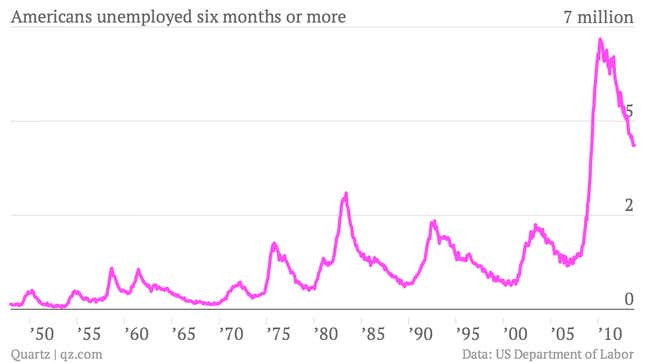
Since the Department of Labor began keeping track in 1948, the US has rarely had more than two million workers go without a job for more than six months. At the height of the recent Great Recession, nearly seven million people who wanted jobs faced extended joblessness, and today that number sits at a cool 4 million. (That’s also historically large as a share of population or the workforce). Despite many positive signs in the economy, that stands as perhaps its largest failure: The US just can’t put its people to work.
As US lawmakers return from their winter vacation, president Barack Obama and the Democrats want to reverse the expiration of unemployment insurance for some 2 million of these people—1.3 million last week, and another 850,000 at the end of March. Typically, unemployment insurance only lasts 26 weeks, but during recessions the federal government offers extensions for as long as 99 weeks; the currently expiring extension is set at 73 weeks.
Republicans support the expiration, or at least want an equal reduction in spending elsewhere in the government. The economic question is whether taking away an average $300 a week from these people will make them more or less likely to wind up with jobs. With roughly three unemployed workers competing for every job opening in the United States and the long-term unemployed among the most-discriminated against potential hires, it’s not clear that unemployment insurance is the main obstacle to their hiring.
Still, critics of the payments contend that ending them will force people back to work at minimum wages. But at least one natural experiment suggests that’s not what’s going to happen: North Carolina cut its unemployment benefits significantly last summer, and since then, there hasn’t been a boom in employment. Instead, people are leaving the workforce in droves, putting stress on local charities and the economy there. Absent renewal of the benefits, we can expect the US workforce to stay shrunken—which doesn’t bode well for rebuilding America’s economic capacity or its middle class.